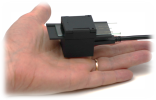We are building the next generation software driven microscope that solves the problems faced in research and diagnostic laboratories worldwide. One of the biggest problems in Academia and Pharmaceutical research is that R&D takes very long time and is very expensive. In addition, currently 47% of the world population has little to no access to diagnostics. Our lensless phase microscope is capable of solving both of these problems. Not only is it miniature, but our microscope is able to generate vast amounts of data. We believe the future of pharmaceutical research is data driven and we can provide the data signal to power AI. We envision that with our microscope we can train data sets to enable AI driven image analysis software, facilitating faster R&D times for both academia and pharmaceutical companies. In addition, due to the lack of objective lenses, we can produce an affordable diagnostic microscope for the low-income countries, solving one of the biggest pain points in the developing world. We ask you to join us on the exciting journey into the future of microscopy and diagnostics.
The technology
Our team is developing an innovative lensless phase microscope which will provide high-resolution imaging without the traditional imaging objectives. We envision that our compact non-invasive phase microscope could be used in various types of biological laboratories and outside the laboratory environment.
Advantages of phase imaging include noninvasiveness, no sample preparation, and no staining required.
Non-invasive phase microscopy is utilized at biological laboratories worldwide due to its label-free and harmless exposure to specimens. The “phase” means that images bring information about the light delay in cells which is recalculated to the inner structure of the specimens, such as refractive index/thickness/dry mass. Im.Engine solution is based on computational imaging and light propagation research which provide imaging in lensless configuration. It means that lenses are replaced by computational algorithms, which simplify the microscope hardware and make it compact. The obvious benefits:
· Compact solution, which makes a microscope a portable and handy device.
· Lensless realization enables sustainable resource-wise development which does not need extra lens production and results in non-expensive devices.
· Compact configuration allows making a case with IP68 water and dust protection, which provide a possibility to work in harsh environments as e.g. cell incubators with high humidity.
· From the operative point of view, the production of such a device with a minimum number of components does not demand complex and expensive facilities (e.g. lens manufacturing).
· Improve diagnosis rates and expected outcomes for people around the world by facilitating point-of-care diagnosis, eliminating the need for repeat visits to a clinic or cold sample storage, and transportation from remote areas to distant laboratories.
· Cheap and portable microscopy will enable a higher resolution of global healthcare monitoring. With artificial intelligence now able to analyze and operate vast amounts of health data, a global input network, based on accessible devices such as lensless microscopes, needs to provide that data to realize the benefits of machine learning in public health.
Do you use microscopes in your work? We want to hear from you! Take part in our survey


Goal
High-resolution imaging without the traditional imaging objectives.
Funding source
Business Finland, Research to Business funding
Contact persons
Igor Shevkunov
Senior Research Fellow Igor Shevkunov
Igor Shevkunov